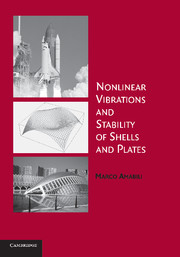Book contents
- Frontmatter
- Contents
- Preface
- Introduction
- 1 Nonlinear Theories of Elasticity of Plates and Shells
- 2 Nonlinear Theories of Doubly Curved Shells for Conventional and Advanced Materials
- 3 Introduction to Nonlinear Dynamics
- 4 Vibrations of Rectangular Plates
- 5 Vibrations of Empty and Fluid-Filled Circular Cylindrical Shells
- 6 Reduced-Order Models: Proper Orthogonal Decomposition and Nonlinear Normal Modes
- 7 Comparison of Different Shell Theories for Nonlinear Vibrations and Stability of Circular Cylindrical Shells
- 8 Effect of Boundary Conditions on Large-Amplitude Vibrations of Circular Cylindrical Shells
- 9 Vibrations of Circular Cylindrical Panels with Different Boundary Conditions
- 10 Nonlinear Vibrations and Stability of Doubly Curved Shallow-Shells: Isotropic and Laminated Materials
- 11 Meshless Discretizatization of Plates and Shells of Complex Shape by Using the R-Functions
- 12 Vibrations of Circular Plates and Rotating Disks
- 13 Nonlinear Stability of Circular Cylindrical Shells under Static and Dynamic Axial Loads
- 14 Nonlinear Stability and Vibration of Circular Shells Conveying Fluid
- 15 Nonlinear Supersonic Flutter of Circular Cylindrical Shells with Imperfections
- Index
- References
1 - Nonlinear Theories of Elasticity of Plates and Shells
Published online by Cambridge University Press: 08 January 2010
- Frontmatter
- Contents
- Preface
- Introduction
- 1 Nonlinear Theories of Elasticity of Plates and Shells
- 2 Nonlinear Theories of Doubly Curved Shells for Conventional and Advanced Materials
- 3 Introduction to Nonlinear Dynamics
- 4 Vibrations of Rectangular Plates
- 5 Vibrations of Empty and Fluid-Filled Circular Cylindrical Shells
- 6 Reduced-Order Models: Proper Orthogonal Decomposition and Nonlinear Normal Modes
- 7 Comparison of Different Shell Theories for Nonlinear Vibrations and Stability of Circular Cylindrical Shells
- 8 Effect of Boundary Conditions on Large-Amplitude Vibrations of Circular Cylindrical Shells
- 9 Vibrations of Circular Cylindrical Panels with Different Boundary Conditions
- 10 Nonlinear Vibrations and Stability of Doubly Curved Shallow-Shells: Isotropic and Laminated Materials
- 11 Meshless Discretizatization of Plates and Shells of Complex Shape by Using the R-Functions
- 12 Vibrations of Circular Plates and Rotating Disks
- 13 Nonlinear Stability of Circular Cylindrical Shells under Static and Dynamic Axial Loads
- 14 Nonlinear Stability and Vibration of Circular Shells Conveying Fluid
- 15 Nonlinear Supersonic Flutter of Circular Cylindrical Shells with Imperfections
- Index
- References
Summary
Introduction
It is well known that certain elastic bodies may undergo large displacements while the strain at each point remains small. The classical theory of elasticity treats only problems in which displacements and their derivatives are small. Therefore, to treat such cases, it is necessary to introduce a theory of nonlinear elasticity with small strains. If the strains are small, the deformation in the neighborhood of each point can be identified with a deformation to which the linear theory is applicable. This gives a rationale for adopting Hooke's stress-strain relations, and in the resulting nonlinear theory large parts of the classical theory are preserved (Stoker 1968). However, the original and deformed configuration of a solid now cannot be assumed to be coincident, and the strains and stresses can be evaluated in the original undeformed configuration by using Lagrangian description, or in the deformed configuration by using Eulerian description (Fung 1965).
In this chapter, the classical geometrically nonlinear theories for rectangular plates, circular cylindrical shells, circular plates and spherical shells are derived, classical theories being those that neglect the shear deformation. Results are obtained in Lagrangian description, the effect of geometric imperfections is considered and the formulation of the elastic strain energy is also given. Classical theories for shells of any shape, as well as theories including shear deformation, are addressed in Chapter 2.
Information
- Type
- Chapter
- Information
- Publisher: Cambridge University PressPrint publication year: 2008
References
Accessibility standard: Unknown
Why this information is here
This section outlines the accessibility features of this content - including support for screen readers, full keyboard navigation and high-contrast display options. This may not be relevant for you.Accessibility Information
- 1
- Cited by
